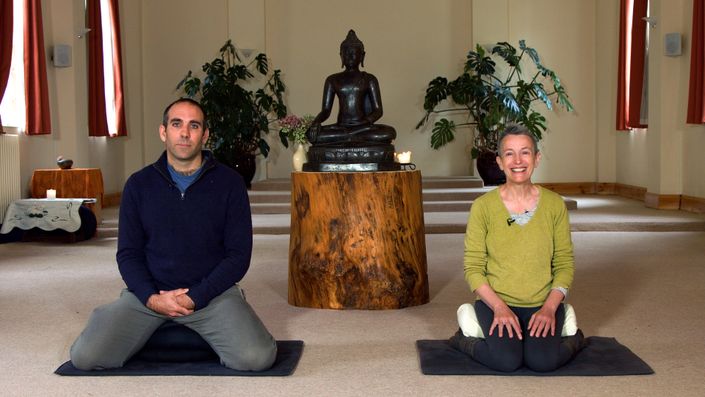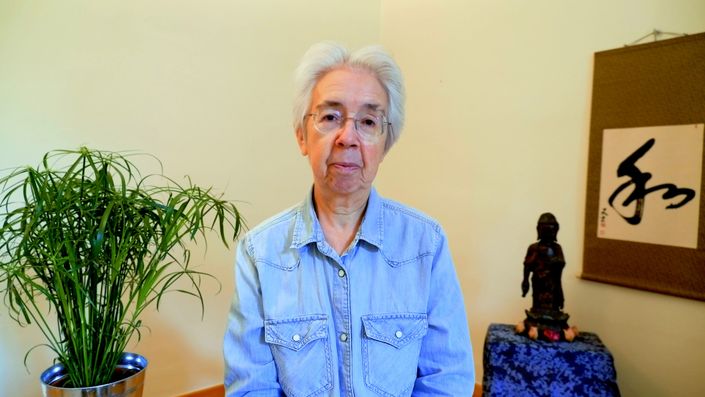Embracing Impermanence and Imperfection:
Bringing Compassion to Life
With Martine Batchelor, Laura Bridgman, and Gavin Milne
Everything changes. Nothing is perfect. Yet when we turn toward life just as it is, wisdom and compassion arise. This profound online course explores impermanence, imperfection, and conditionality as doorways to an awakened heart.
Enroll today and study at your own pace.

The Heart of Buddhist Practice
Students will benefit from a meditation program that encourages direct insight into the changing, selfless nature of reality while cultivating heart qualities. In fact, it will become clear that the result of embracing impermanence and imperfection is the compassionate wish to be of benefit to others. A major focus will therefore be bringing our path of practice into relationships, work, and family life. We'll look at how we can creatively engage with the world around us and how we might find wise responses to the problems and crises of our time.
A twofold program of meditation
This course will deepen your understanding of the impermanent, imperfect, conditional nature of experience. When this is seen, the heart opens to life and embraces the changing flow of existence, just as it is. This is wisdom, and it gives rise to equanimity—a protective quality. As our capacity to accept change and imperfection increases, resistance gives way to kindness and caring. We no longer fear and despair, but embody the most appropriate attitude to an imperfect, transient world: compassion.
To support this transformation, we offer a special intertwining of two paths:
- 6 insight meditations to understand the flow of impermanent, imperfect, and impersonal conditions that constitute experience.
- 6 brahmavihara (divine abode) meditations to cultivate supportive qualities of the heart and help us open to reality.


Nuanced understanding
When we begin meditating we might have conceptual knowledge of impermanence, imperfection, and conditionality. We understand intellectually that things end, that they depend on cause and effect—but this understanding may not inform our emotional habits or behavior.
As the contemplative life unfolds, we intuit impermanence and imperfection a little more deeply. However, we may misapply these teachings: "Oh, that's life. Things are impermanent. Too bad."
This course offers a more empathetic route for our development. When we really grasp impermanence, compassion arises. We become comfortable with impermanence and imperfection, and so can turn to face our problems and those of others with compassion, equanimity, and wisdom.

Experienced teachers
Martine, Laura, and Gavin are respected teachers associated with Gaia House, an insight meditation center in England.

30+ video teachings
14 presentations, 6 guided inquiries, 12 guided meditations, and more. Captions are provided for all videos.

Discover fundamental truths
Insight into impermanence, imperfection, and the emptiness of self is the core of Buddhist practice.

A path for real life
This is a program of practice and inquiry that works in everyday conditions. Your life—family, work, relationships—becomes your practice. What better teacher is there?

Timeless methods
The approach used here is to turn toward experience, just as it is, as taught in the tradition of the Thai Forest monks and the Burmese teacher, Sayadaw U Tejaniya.

Clarity on your path
Connect ancient teachings to your life today with the help of clear examples, teaching stories, inquiry, and reflection.
How the Journey Unfolds
Curriculum
This is a 6-unit course. You are invited to study at your own pace and will retain ongoing access to the course. Each lesson will offer 45-60 minutes of video teachings. There will also be prompts for reflection, optional quizzes, and a communal discussion board. As part of your training, the teachers will suggest a program of inquiry and guided meditation for you to explore between units.
- Introduction (4:05)
- Meditation 3: Lovingkindness (11:27)
- Embracing Imperfection as Felt Experience (21:14)
- Changing our Perception of Imperfection (19:35)
- Mapping the Possibilities
- Check Your Understanding
- Reflect
- Meditation 4: Three Types of Feeling Tone (18:09)
- Discuss
- In Daily Life (9:43)
- Summary
- Introduction (3:12)
- Meditation 11: Being, the Foundation of Response (13:21)
- The Example of the Buddha's Life (14:46)
- Inspiring Examples of Creative Engagement (10:21)
- Creative Engagement in an Imperfect World (14:52)
- Equanimity, not Complacency (3:56)
- Check Your Understanding
- Reflect
- Meditation 12: Equanimity as a Support for Wise Engagement (10:50)
- Discuss
- In Daily Life (16:12)
- The Unexpected Path
- Summary

Martine Batchelor
Martine studied Zen Buddhism under the guidance of the late Master Kusan at Songgwang Sa monastery until 1984. Her Zen training also took her to nunneries in Taiwan and Japan. From 1981 she served as Kusan Sunim's interpreter and accompanied him on lecture tours throughout the United States and Europe. She translated his book The Way of Korean Zen. Following Master Kusan’s death she returned her nun’s vows and left Korea.
Martine is the author of Principles of Zen, Meditation for Life (an illustrated book on meditation), The Path of Compassion, Women in Korean Zen, and Let Go: A Buddhist Guide to Breaking Free of Habits. Her latest book is The Spirit of the Buddha. She is the teacher of the online courses, Knowing How it Feels: Creatively Engaging with Habits and, with Stephen Batchelor, Secular Dharma.

Laura Bridgman
Laura began meditating in her early teens and ordained as a Buddhist nun in 1995. She was resident at Amaravati and Chithurst monasteries under the guidance of her teachers Ajahn Sumedho and Ajahn Succito. Laura left the monastic tradition in 2015 and is now Staff Support Teacher at Gaia House, a retreat center in Devon, England. She has spent extended periods practicing with the Burmese teacher Sayadaw U Tejaniya. Laura taught Beyond the Inner Critic, a Tricycle Online Course, with Gavin Milne.

Gavin Milne
Gavin has been practicing Insight Meditation since 2004 and was invited to train as a teacher under the guidance of Yanai Postelnik in 2015. Inspired and influenced by other paths, Gavin is particularly interested in exploring practice wherever we find ourselves—whether in the midst of family life or responding to the wider issues of our era. Together with Laura, he is a co-teacher of Beyond the Inner Critic, a Tricycle Online Course.
Testimonials
This course presents profound and complex insights in a way that is easy to absorb and practice. The teachers wisdom is thoughtfully and humbly presented, providing a workable model for my own practice.
This is a beautifully taught, well structured course that gives you new perspectives and practices (off and on the cushion). It breathes new life into your relationship with impermanence, imperfection and conditionality, even if you’re a long-term practitioner.
Amazing introduction to the often challenging subject of impermanence and change. Beautifully facilitated!



